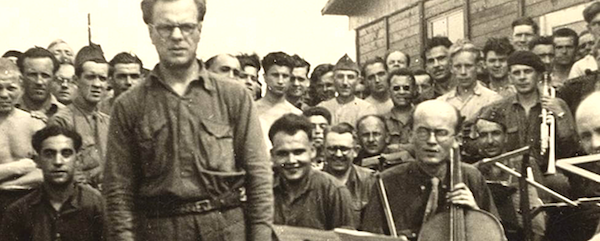Suddenly, a song would arise
- HANNAH NIEMEIER
On Messiaen's "Quartet for the End of Time", performed in the crypt of a church in Harlem.
 Jean le Boulaire, Olivier Messiaen (standing), Henri Akoka, and Étienne Pasquier with prisoners and
Jean le Boulaire, Olivier Messiaen (standing), Henri Akoka, and Étienne Pasquier with prisoners and guards at Stalag VIII-A, Görlitz, Germany, at the premiere of Quartet for the End of Time in 1941.
Photo: Chamber Music New Zealand.
"The four musicians played on broken instruments: Étienne Pasquier's cello had only three strings; the keys on my upright piano remained lowered when depressed . . . it's on this piano, with my three fellow musicians, dressed in the oddest way — I myself wearing a bottle-green suit of a Czech soldier — completely tattered, and wooden clogs large enough for the blood to circulate despite the snow underfoot . . . that I played my Quartet for the End of Time."
This is the French composer Olivier Messiaen's account of the premiere of his Quatuor pour la fin du temps on January 15, 1941. The venue was Stalag viii-a, a Nazi prison camp in Görlitz, Germany. Around four hundred prisoners and guards were in attendance.
Messiaen (1908–92), a member of a group of experimental composers who called themselves "The Young France," had been serving as a war nurse when he was captured in the German invasion of 1940. When guards found musical scores in Messiaen's pockets on his arrival at Görlitz, they gave him "special privileges," allowing him to play the camp's organ and providing writing materials for him. The Belgian guard Karl-Albert Brüll also helped acquire instruments for Messiaen and the musicians he befriended in the camp: the violinist Jean le Boulaire, the cellist Étienne Pasquier, and the clarinetist Henri Akoka. They practiced in the camp's washrooms and performed in the barracks in near-freezing temperatures.
❧
No performance of the quartet could compare with the premiere for its harrowing context and the need for music to lighten the darkness — not even when the "concert hall" is a crypt, as it was last week at the Church of the Intercession in Harlem. With its combination of aesthetic appeal and acoustic quality, Andrew Ousley's "Death of Classical" concert series has proven increasingly popular over the past four years with music enthusiasts for whom "atmosphere" is a concern, or a draw. All that could save a series with this theme, playing this piece, from irreverence is the music itself. And in this performance, it did.
On this mild evening in February, the quartet featured the violinist Stefan Jackiw, the cellist Jay Campbell, the clarinetist Yoonah Kim, and the pianist Orion Weiss. In the small space, the opening notes of the first movement, "Liturgy of the crystal," sounded disconcertingly close. Messiaen's source text was the passage in Revelation chapter ten in which an angel claims that "there shall be time no longer." The music of Messiaen's apocalypse surrounded the audience of around one hundred, seated on chairs with kneelers at their bases.
Messiaen, a synaesthete who saw colors when he heard sounds, wrote detailed program notes to illustrate the eight-movement work. "Between three and four in the morning, the awakening of birds," the "Liturgy of the crystal" begins. "A solo blackbird or nightingale improvises": this is the clarinet. The melody swoops low at first and bursts suddenly into high, rapid phrases that sound like birdsong. In fact, one of Messiaen's goals in his music was to recreate the sounds of bird calls; as often as he could, he and Pasquier took the dawn military watch at Görlitz to listen to the birds wake up.
❧
The music throughout the quartet is perplexing in melody, harmony, and rhythm as Messiaen attempts to convey the sounds of eternity. In the second movement, the "angel who announces the end of time" arrives to the "sweet cascades of blue-orange chords" in the piano. But the third movement, the "Abyss of the birds," is something else entirely. In this extended solo for the clarinet, the music moves from birdlike flutters to melodic phrases so long and slow that time almost seems to stop, from blaring fortissimos to pianissimos so soft that I was unsure whether I was hearing anything at all.
All that could save a series with this theme, playing this piece, from irreverence is the music itself. And in this performance, it did.
"I'll never be able to play it," Akoka said when he first read Messiaen's score for the third movement, staring at, among other difficulties, the excruciatingly slow tempo marking of forty-four beats per minute — to the eighth note. Performing the "Abyss" is a feat almost more athletic than musical, and Kim gave the strongest performance of the evening. I was exhausted just watching her, and I couldn't help but think that this was Messiaen's point. The audience goes into the abyss with the music.
And they get out, too, but not without a long climb upward. While the third movement is the most physically impressive, the fifth and eighth are the quartet's definitive sections, narratively and musically. In the notes for the former, "Praise to the eternity of Jesus," Messiaen evokes the idea from John 1:1 that Jesus is the eternal Word with "a broad phrase, infinitely slow, on the cello." The original violinist, Le Boulaire, said of such passages: "Amid all this severity, suddenly, a song would arise."
From here, the quartet moves with rapidly building intensity to its conclusion. Messiaen describes the sixth movement, "Dance of fury, for the seven trumpets" as "music of stone, formidable granite sound . . . huge blocks of purple rage." Call them the Blocks of Purple Rage Quartet: while blunt in some of the more delicate sections, these four musicians excelled at the explosive elements of Messiaen's apocalypse.
The eighth and last movement, "Praise to the Immortality of Jesus," is the violin counterpart to "Eternity." In its "slow ascent to the acutely extreme," it represents, for Messiaen, "the ascent of man to his god." Rest, or beauty, is never far away in the quartet, but what is singular about Messiaen's music is that these sublime moments are never a respite. In the slow movements and soft moments, the music does not let up, but instead seems to expand, drawing the listener in even closer. It was unfortunate, then, that neither Jackiw nor Campbell could quite sustain this intensity. They quavered in the long and soft notes in their later solos, but then, who (except, of course, Kim) wouldn't?
❧
Still, the conclusion was gripping in this small space; the audience was swept up into the quartet's strengths and weaknesses, its excruciating intensity, and a silence that, by the end, had been earned.
We leave it to Messiaen to remind us — in wartime, in the crypt, and in the apocalypse — of birdsong.
Last week's standing ovation was not quite the same response as that of the audience at Stalag viii-a. One member of the original quartet recalled, "The audience, as far as I remember, was overwhelmed at the time. They wondered what had happened. Everyone. We too. We asked ourselves, 'What are we doing? What are we playing?' "
In a way, they were performing the composer's liberation. Messiaen was freed shortly after the quartet's premiere, again with Brüll's help. He managed to resume his career in German-occupied Paris, partly because his music, with its avian sounds and sense of otherworldliness, was considered apolitical.
The first performance of the Quartet for the End of Time has become a legend about the experience of prisoners of war, furthered, at times, by Messiaen himself (he exaggerated minor details in his account of the premiere, for example). But in fact, the hellish context of the quartet's premiere brings our attention back to the music itself. We leave it to Messiaen to remind us — in wartime, in the crypt, and in the apocalypse — of birdsong.

Israeli chamber project Daniel Bard, Violin; Tibi Cziger, Clarinet; Michal Korman, Cello; Yael Kareth, Piano Live Performance at Elma Arts Center, Israel. March, 2017

 This is Meaghen Gonzalez, Editor of CERC. I hope you appreciated this piece. We curate these articles especially for believers like you.
This is Meaghen Gonzalez, Editor of CERC. I hope you appreciated this piece. We curate these articles especially for believers like you.
Please show your appreciation by making a $3 donation. CERC is entirely reader supported.

Acknowledgement
 Hannah Niemeier. "Suddenly, a song would arise." The New Criterion (February 12, 2019).
Hannah Niemeier. "Suddenly, a song would arise." The New Criterion (February 12, 2019).
Reprinted with permission of Hannah Niemeier and The New Criterion.
The Author
 Hannah Niemeier graduated in May 2018 with a degree in English and journalism. She is the Hilton Kramer Fellow in Criticism at The New Criterion in New York. Find her on Twitter @Hannah_Cristine.
Hannah Niemeier graduated in May 2018 with a degree in English and journalism. She is the Hilton Kramer Fellow in Criticism at The New Criterion in New York. Find her on Twitter @Hannah_Cristine.




